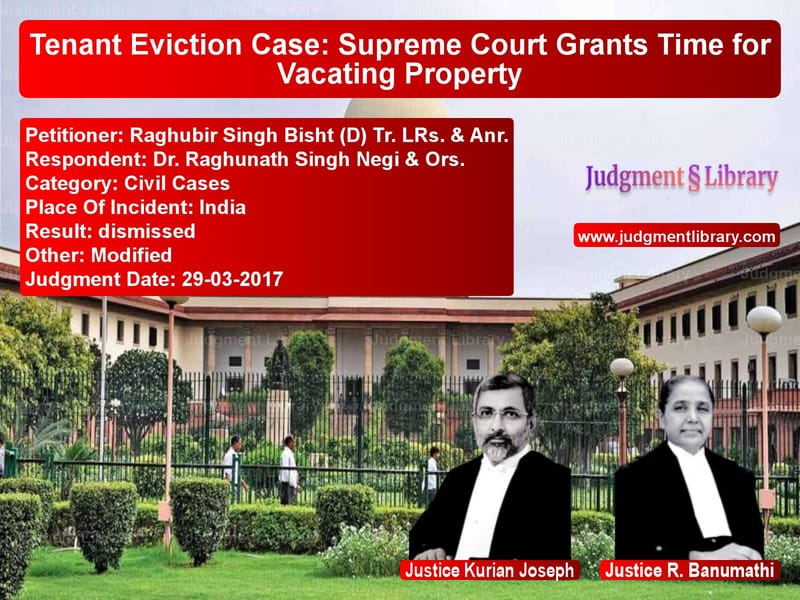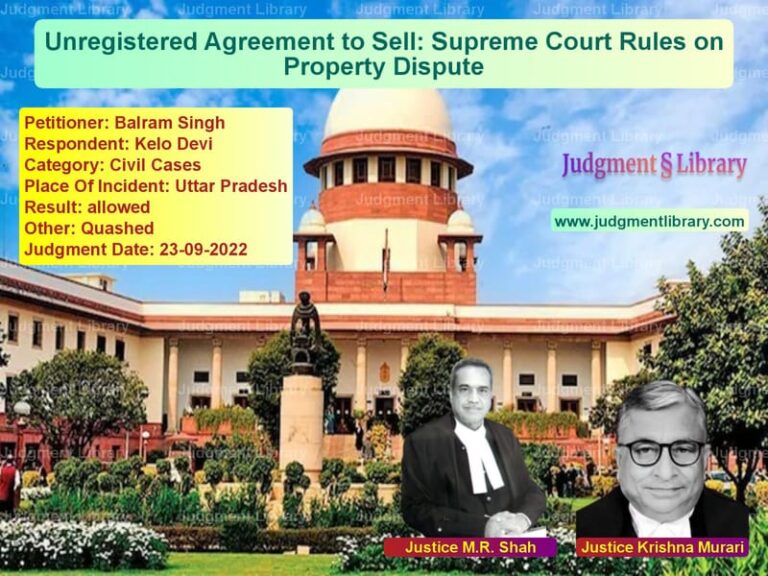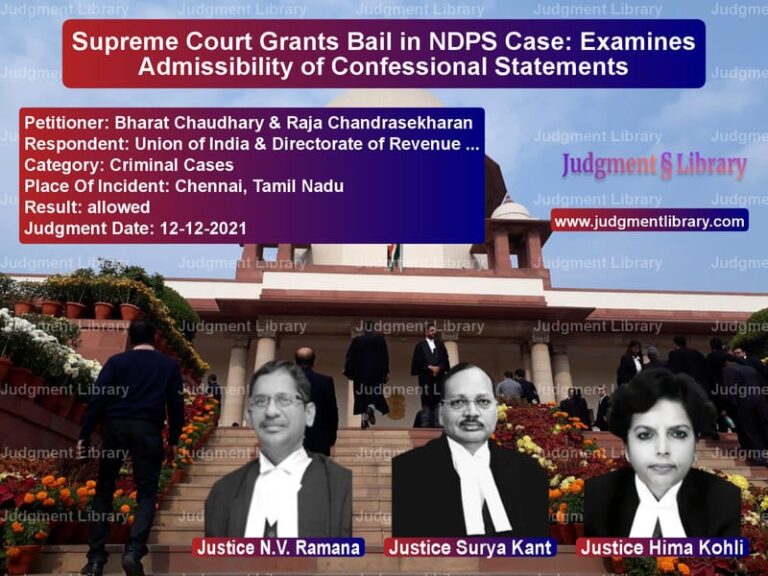Tenant Eviction Case: Supreme Court Grants Time for Vacating Property
For decades, disputes between landlords and tenants over property possession have led to complex legal battles. One such case that reached the Supreme Court is Raghubir Singh Bisht (D) Tr. LRs. & Anr. v. Dr. Raghunath Singh Negi & Ors., where a commercial tenant sought additional time to vacate the premises after multiple unfavorable rulings by the lower courts. The Supreme Court, while upholding the eviction order, balanced the rights of both parties by allowing the tenant additional time under strict conditions.
Background of the Case
The dispute dates back more than three decades when the respondent, Dr. Raghunath Singh Negi, sought to reclaim his commercial property occupied by the appellants, who operated a hotel on the premises. The eviction suit was initially filed due to non-compliance with rental terms and a long-pending need for the landlord to utilize his own property for personal business. The trial court ruled in favor of the landlord, leading to a series of appeals by the tenant.
The matter was escalated to the High Court, which upheld the eviction, stating that the landlord had the absolute right to reclaim possession after the expiration of the lease. Still unsatisfied, the tenant moved the Supreme Court, arguing for an extension of time to vacate the property. The Court had to consider whether further relief should be granted to the tenant and under what conditions.
Arguments Presented by the Petitioner
The appellants, led by their legal counsel, presented the following arguments in support of their case:
- The commercial establishment had been operational for several decades, and an immediate eviction would cause severe financial hardship.
- Given the tenant’s dependency on the business, the eviction should be phased, allowing them time to find an alternative location.
- The pandemic and economic downturn had severely impacted businesses, and a forced eviction at such a time would be unjust.
Counterarguments by the Respondent
The respondent, through his legal representatives, countered these claims with the following arguments:
- The landlord had waited more than thirty years to reclaim possession of his property, which was unjustly withheld by the tenant.
- The eviction suit had been legally decided in favor of the landlord at every judicial level, from the trial court to the High Court.
- Continued occupation of the premises would violate the landlord’s right to use his property for personal business ventures.
Supreme Court’s Judgment
After considering both sides, the Supreme Court issued a balanced ruling. While it upheld the eviction order, it provided the tenant additional time to vacate under strict conditions:
- The appellants were granted time to vacate the premises until the last day of the month in which Deepawali falls in the year 2018.
- The tenant was prohibited from inducting new partners or subletting the premises.
- No significant alterations or changes to the business could be made during the extended stay.
- The tenant was required to continue paying rent without fail as use and occupation charges.
- An undertaking incorporating these conditions had to be filed within one month of the order.
- Failure to comply with these conditions would invite contempt proceedings.
The Court also directed that there would be no additional costs awarded to either party.
Key Legal Takeaways
The Supreme Court’s ruling clarifies important principles in landlord-tenant disputes:
- Tenant Rights vs. Landlord Rights: The judgment balances the tenant’s financial dependency on the premises with the landlord’s fundamental right to reclaim possession.
- Time-Bound Evictions: Courts may grant limited extensions under strict conditions rather than indefinite occupancy.
- Judicial Discretion in Eviction Cases: Even when eviction is legally justified, courts have the discretion to allow time for smooth transitions.
Implications for Future Cases
This ruling has far-reaching consequences for similar disputes:
- Landlords seeking eviction may expect courts to acknowledge delays in reclaiming property while ensuring compliance with rental terms.
- Tenants must understand that appeals cannot indefinitely delay eviction orders unless reasonable grounds exist.
- Legal precedents now suggest that extensions to vacate may only be granted with enforceable conditions.
Conclusion
The Supreme Court’s decision in Raghubir Singh Bisht v. Dr. Raghunath Singh Negi reiterates the importance of adhering to rental agreements while considering the rights of both landlords and tenants. By allowing additional time with stringent conditions, the Court provided a fair resolution to a decades-old dispute. This ruling sets a crucial precedent for future eviction cases, ensuring that both parties are treated justly under the law.
Don’t miss out on the full details! Download the complete judgment in PDF format below and gain valuable insights instantly!
Download Judgment: Raghubir Singh Bisht vs Dr. Raghunath Singh Supreme Court of India Judgment Dated 29-03-2017.pdf
Direct Downlaod Judgment: Direct downlaod this Judgment
See all petitions in Property Disputes
See all petitions in Landlord-Tenant Disputes
See all petitions in Specific Performance
See all petitions in Judgment by Kurian Joseph
See all petitions in Judgment by R. Banumathi
See all petitions in dismissed
See all petitions in Modified
See all petitions in supreme court of India judgments March 2017
See all petitions in 2017 judgments
See all posts in Civil Cases Category
See all allowed petitions in Civil Cases Category
See all Dismissed petitions in Civil Cases Category
See all partially allowed petitions in Civil Cases Category







